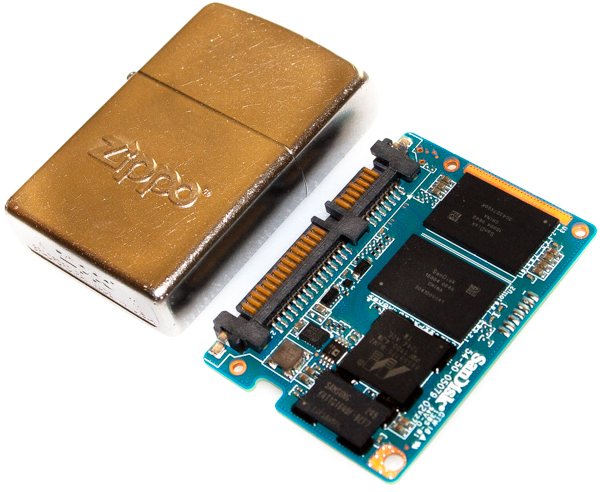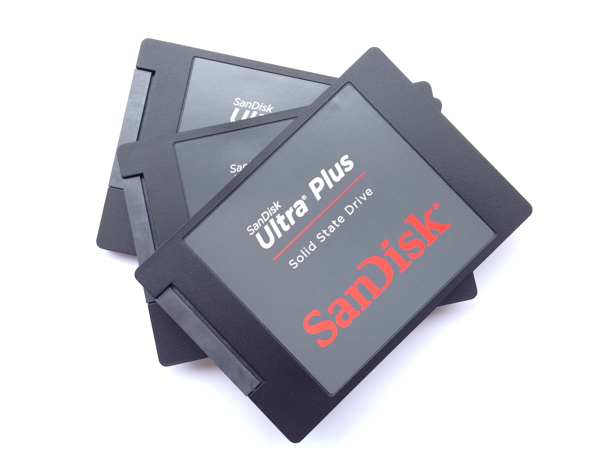SanDisk Ultra Plus SSD Reviewed At 64, 128, And 256 GB
SanDisk's Ultra Plus replaces the company's older SATA 3Gb/s SandForce-based Ultra with something a bit more modern, and with a budget-oriented price tag. We test all three capacities to see if the entry-level pricing belies a pocket rocket in disguise.
SanDisk Shows Us That Average Can Be Interesting
The SSD industry has a feudal dynamic of sorts. Up top you have the big powers, the players with fabs. In the middle and at the bottom, you have the other contenders, each paying homage to the organizations that create the NAND on which they all rely. Samsung, Intel, Micron, Hynix, Toshiba, and SanDisk each fab their own flash, though each plays a different role in the retail market and as a supplier to smaller SSD vendors. One thing is for certain: the inexorable fact that owning a own fab gives you a huge leg up economically and technically.
Further, the knowledge that goes along with designing flash provides even more insight to draw from when it comes to designing products based on that memory. There are a few notable exceptions, but the days of many firms pumping a crazy number of models into the market are drawing to a close. When there are flash supply issues downstream, it won't be SanDisk and the company's contemporaries that suffer. There are too many pressures on the smaller companies, especially the ones without big OEM and data center sales. Something has to give eventually, and the Ultra Plus represents the sort of product those other players need to watch out for.
True, the UltraPlus isn't brutally fast. It falls into the soft and soggy mid-range across its specification sheet. Performance ranges from excellent to merely good. But we can't really complain because we know that this is the space SanDisk was aiming for. Given budget pricing and a very sparse bundle, there's no pretense of benchmark magic or fat extras in the package. It's just a SSD in a box with a slightly different mix of controller, firmware, and attitude.
Right now, that's good enough to make the Ultra Plus a great alternative to many of the value-oriented products floating around. Considering the many drives offering solid performance for the price, we're really saying something profound. The newly-minted SanDisk Extreme II is definitely a cut above when it comes to speed. However, SanDisk is charging more for it too. For most mainstream buyers, the Ultra Plus and its mid-range competition are just what the doctor ordered.
The largest Ultra Plus is as fast as last year's quickest drives in most circumstances, with the added benefit of lower per-gigabyte pricing. On the other end of the spectrum, the 64 GB model is ninja-quick for its size. If you're looking for something inexpensive to drop into an older system, or to create a reasonable RAID 0 array, the smallest Ultra Plus could be an ideal candidate. But it's hard to justify the 64 GB model at all when the 128 GB version sells for a few dollars more, and with performance closer to the 256 GB drive. Regardless of capacity, the Ultra Plus is at home with the lighter workloads that typify average computing environments.
Any of the Ultra Plus drives might be an interesting alternative to the rapidly-disappearing Crucial m4, a drive that helped pave the way for exceptional performance at lower prices over the last year. You could always count on the m4 being a good deal. Now that it's on its way out, SSDs like SanDisk's are in a great position to slide in.
Get Tom's Hardware's best news and in-depth reviews, straight to your inbox.
Current page: SanDisk Shows Us That Average Can Be Interesting
Prev Page Results: Power Consumption-
kevith I have had the former SanDisk Extreme 128 GB for a year now, and it´s definitely fast enough. But what´s more impressive is, that after a year, the write amplification still hovers between 0,800 and 0,805. I´m using it in my laptop for quite "normal" use, FB, YouTube, mail, wordprocessing etc.on Windows 8 64-bit. So far it has served me very well, my next SSD is going to be another SanDiskReply -
Soda-88 I recommended this SSD (256GB) to my friend just a week ago since it was nearly as cheap as top of the line 128GB SSDs, glad to read positive review.Reply -
alidan im honestly looking into ssd drives for games and mass small file storage.Reply
these are cheap, and they are large, would definitely help with load times/game performance, and browsing images stored enmass. -
Brian Fulmer I ordered 5 Extreme 128GB drives in March (model SDSSDHP-128G). I've been using OCZ, Kingston, Samsung and Crucial drives in every desktop and notebook I've deployed since August 2013. Out of ~75 drives, I've had 1 bad Vertex 4 and 6 defective by design Crucial V4's. Of the 5 SanDisks, 2 failed before deployment. Support was laughably incompetent in demanding the drives be updated with the latest firmware. Their character mode updater couldn't see the drives, because they DIED. SanDisk is no longer on my buy list.Reply
Incidentally, of the 8 SSD model SSD P5 128GB, I've had one die. The context should be of 35 Vertex 4's, I've had one die. I've had zero failures with 15 840's despite their supposedly fragile design. -
ssdpro Brian Fulmer's comments are very reasonable (except the "deployed since Aug 2013" part lol). Way too many people experience a failure then scream all drives from that mfg are junk. I have owned 2 840 Pro drives and had one fault out. Does that mean Samsung drives have a 50 percent failure rate? For me, yes, but overall no and I am definitely not that naive. The 840 Pro can and do fail like anything electrical can. I have owned probably a dozen OCZ drives and had one Vertex 2 failure - does that mean OCZ/SandForce firmware stinks and they aren't reliable? No, it just means a drive died and who knows why. I have owned a couple SanDisk products and none failed. Does that mean SanDisk is the best? No... it just means I didn't have one die but I also only sampled 2.Reply -
Combat Wombat These and the OCZ drives from newegg are looking mighty close in price!Reply
BF4 Rebuild is about to take place :D -
@ssdpro: spot on. sure, if i buy from vendor a and his product fails, i will probably not buy from him again. if it fails more than once, there is no chance i'll buy his stuff again and i also will warn others about it. but understandable as this is, in the end even that doesn't mean much about the reliability of the manufacturer.Reply
that's also why i'm a bit sceptical about product ratings on amazon and the likes, since people are more inclined to complain about a bad experience, than share their view on a product that simply does what it should do: work.
what we would need more often are statistics from bigger companies, or even repair services, so we don't have to base our purchases on samples of a few dozen to a few hundreds, but on thousands upon thousands of cases. -
flong777 The 840 Pro still appears to be the fastest overall SSD on the planet - but the difference between the top 5 is pretty much negligible. Among the top five, reliability and cost become the determining factors.Reply -
anything4this I don't understand the ~500MBs read limit on the drives. Is it an interface bottleneck?Reply

